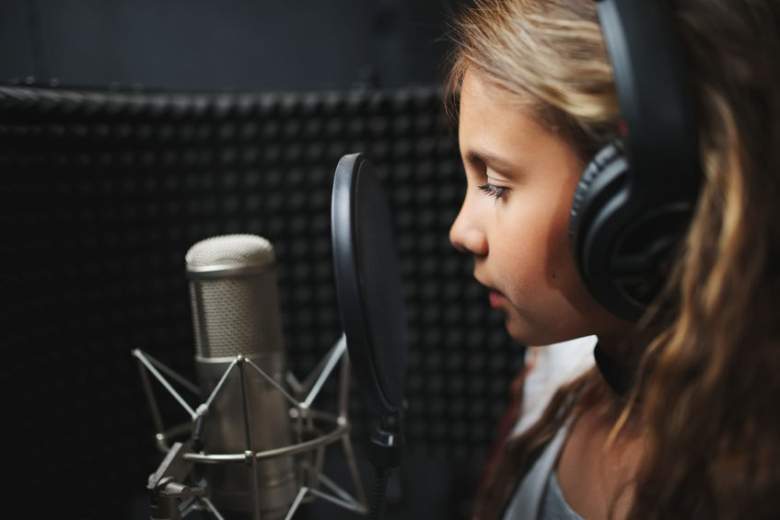
To get the best recordings, you want your input to be as dry as possible, without any additional reflections from your space. These reflections limit what you’re able to do in your DAW and can make life difficult during mixing and mastering. If your home studio isn’t ideal for recording, check out these cheap microphone shields as an easy-to-deploy solution.
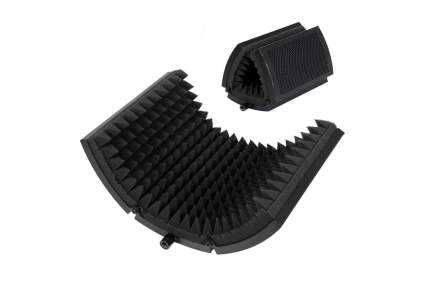
|
Amazon Customer Reviews
|
Price: $31.99 Shop at Amazon | Shop now Read our review |
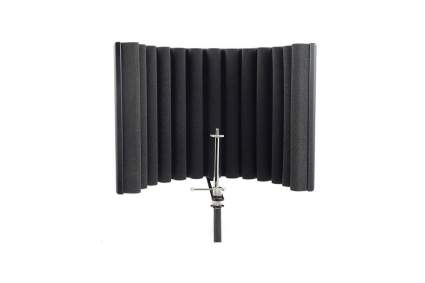
|
Amazon Customer Reviews
|
Price: $99.00 Shop at Amazon | Shop now Read our review |
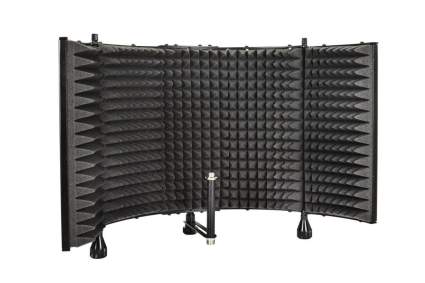
|
Amazon Customer Reviews
|
Price: $127.93 Shop at Amazon | Shop now Read our review |
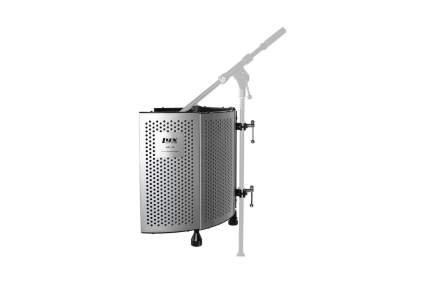
|
Amazon Customer Reviews
|
Price: $99.99 Shop at Amazon | Shop now Read our review |
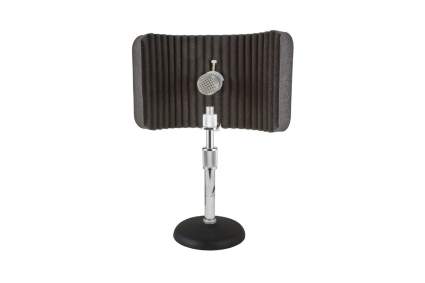
|
Amazon Customer Reviews
|
Price: $68.00 Shop at Amazon | Shop now Read our review |
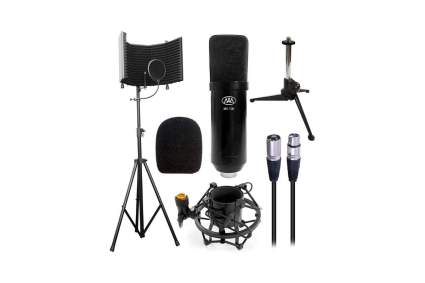
|
Amazon Customer Reviews
|
Price: $159.95 Shop at Amazon | Shop now Read our review |
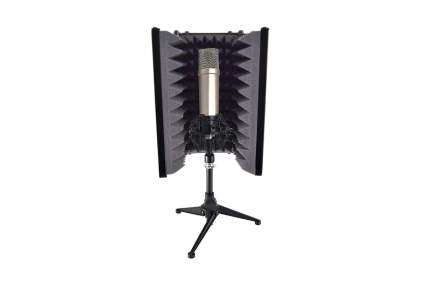
|
Amazon Customer Reviews
|
Price: $31.99 Shop at Amazon | Shop now Read our review |
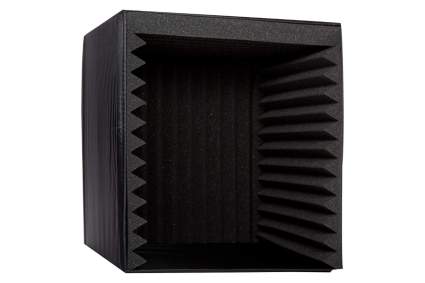
|
Amazon Customer Reviews
|
Price: $29.99 Shop at Amazon | Shop now Read our review |
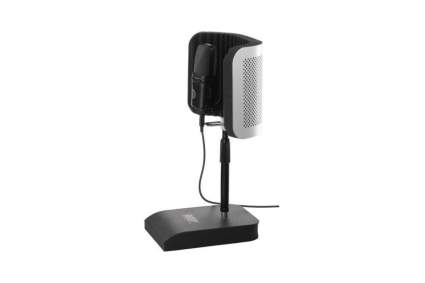
|
Amazon Customer Reviews
|
Price: $41.99 Shop at Amazon | Shop now Read our review |
-
1. Tonor Microphone Isolation Shield
Pros:- Inexpensive
- Three-panel design folds up when not in use
- Steel backing
- Perfect for USB mics like the Blue Yeti
Cons:- Says it can be stood on a desk, but has no feet
- On the small side
- Stand not included
- No mic stand adapter included
Technically, the AW Studio Microphone Isolation Shield is cheaper, but it’s not as well reviewed as this simple but effective solution. This is a three-panel design, which allows it to fold up relatively small when not in use. Obviously, at this price, the foam isn’t the world’s best, but as a beginner option, it’s worth checking out, especially if the reflections in your room are particularly bad.
-
2. SE Electronics RF-X Portable Vocal Booth
Pros:- Four layer design for enhanced isolation
- Lighter than many other options
- Sturdy hardware
- Includes US and Euro adapters
Cons:- May not work on boom stands
- Vague instructions
- Foam is good, but not exceptional
- Setup can be tricky
sE Electronics makes a couple of the best cheap microphones including the V7 Dynamic Microphone and SE2200 Large-Diaphragm Condenser, so they have the experience designing products for home recording situations. Their microphone shield is no different, offering good handmade construction for not much money.
This vocal booth uses a four-layer design with starting with thick foam, an air gap, a wool layer, and a sharp-looking composite exeterior. It measures roughly 16 by 12 inches, which should provide enough surface area to do the job in most cases. It’s on the higher end of the price scale, but it’s also better made.
If you want to upgrade from this, you could consider their Reflexion Filter Pro or the competitive CAD Audio Acousti-Shield AS32.
-
3. Monoprice Microphone Isolation Shield
Pros:- Largest of the cheap options
- Includes feet for setting up on a desk
- Comes with both standard threading and an adapter for various mic stands
- Bundle with a pop filter also comes in under $100
Cons:- Quite heavy for a lot of mic stands, especially small ones
- Some issues with threading stripping
- For the size, it might be too short for some applications
- Some units shipped without all the parts
Monoprice makes some frankly amazing audio gear for the price. I’m especially a fan of their instrument cables. They also offer this very handsome microphone shield that looks to my eye a little bit better than other similarly-priced options. Compared to the first two options, the foam is slightly upgraded and covers the larger area that makes up this shield.
When in use, it measures 23.5 inches by 15.4 inches by 11.0 inches and folds down to 17.3 inches when closed. That’s not much of a savings, which means this isn’t the most portable option, but if the others aren’t large enough, this is the one to consider.
Pyle makes a competitive model, as does Neewer.
-
4. LyxPro VRI-10 Vocal Sound Absorbing Shield
Pros:- Detachable feet for desktop use
- Mic stand mounting hardware included
- Lightweight
- Easy to set up
Cons:- Not as effective as more expensive units
- No instructions included for setup
- Not packed with much padding - frame could get damaged in transit
- Some packages missing hardware
If you want to upgrade slightly, try this option. This one swaps the steel back for aluminum, which makes it lighter and possibly more attractive, depending on your taste. Two foldable panels flank three stationary panels allowing for both folding for storage and various configurations.
All the mounting hardware is included to attach this to a microphone stand, but you can also use the feet and stand it up on your desktop if you’re using it for podcasting or spoken word.
There are two sizes available, with the large size measuring 16.5 inches by 15.3 inches by 8.3 inches. The extra large measures 16.9 inches by 12.8 inches by 15 inches.
Buy the LyxPro VRI-40 Portable Acoustic Isolation Instrument Shield here.
-
5. CAD Audio Acousti-Shield AS16 Stand Mounted Acoustic Enclosure
Pros:- Excellent for amplifiers
- Microphone port ensures perfect placement
- Compact size
- Good foam density
Cons:- Stand not included
- May be too small for some applications
- Only works with certain microphones
- Doesn't fold
This novel design integrates the microphone directly into the shield, totally removing the need for complicated setups and guessing. While it only works on pencil and dynamic microphones (see our list of the best cheap microphones for options), it still provies a convenient and compact setup.
These are especially good for amplifiers, but could also be used as a desktop shield, as well. It’s probably a bit too small for vocal work, but since the desktop stand isn’t included, you could mount it to whatever traditional mic stand you like and see if it works for you.
As an alternative, Pyle makes a drum and amplifier microphone shield to consider.
Find more CAD Audio Acousti-Shield AS16 information and reviews here.
-
6. AxcessAbles SF-101KIT Studio Microphone Isolation Shield Bundle
Pros:- Bundle includes everything you need to start recording
- No worries about the shield working with the mic stand
- Stand has feet for desktop use
- Decent isolation for the price
Cons:- Full bundle may blow the budget
- Mic holder can be a bit finicky
- Some units arrive damaged
- All components may require upgrade later
If you have nothing you need to start recording, opting for a bundle is another way to get a cheap microphone shield. The shield itself in this bundle is about on par or slightly lesser than the low end on our list, with lower quality foam. However, as a first step, it still provides some improvement and helps you get started quickly.
This bundle also includes both a floor mic stand and a desktop tripod mic stand, a pop filter, an XLR mic cable, a shockmount, a wind screen, and, yes, the microphone itself. All you need to start recording is a cheap interface like the PreSonus AudioBox USB 96 or a portable audio recorder, as well as some budget studio headphones or monitors.
While some of those may last you a lifetime, as you improve you’ll want to upgrade some of it, particularly the microphone. Still, it’s hard to beat the price of all included here and you can use this to get going right away.
Find more AxcessAbles SF-101KIT information and reviews here.
-
7. Pyle PSMRS08 Compact Microphone Isolation Shield
Pros:- Super-small option ideal for desks
- Excellent for podcasting situations and small amps
- Includes desktop stand
- Flexible setup serves multiple purposes
Cons:- Doesn’t cover nearly as much area as other options
- Doesn’t include adapter for smaller mic stands
- Too heavy for some stands
- Included stand is easily tipped over if knocked
If you don’t have a ton of space in your recording environment — say, on your cluttered desk — go for this option. It can be set up to tightly surround the microphone, which is great for podcasting and close micing guitar amps. The included stand allows you to adjust the height and if you need more coverage, you can fold out the sides to look more like a traditional shield. You can attach this to normal mic stands, but there is no adapter included. This will excel in tight quarters and is good for travel applications.
Buy the Pyle PSMRS08 Compact Microphone Isolation Shield here.
-
8. Pyle PSIB27 Sound Recording Booth Box
Pros:- Box style provides better isolation from reflections from the top and bottom
- Easy setup
- Light and portable
- Inexpensive
Cons:- Not for mounting on mic stands
- Requires a small desktop mic stand
- Some complaints of the box collapsing
- Small
If you want something that completely surrounds your mic, you’ll want to go with a booth-style box. In a pro setting, you’d have a large box that resembled a phone booth entirely sound proofed from the rest of the recording area. You can simulate that to some degree but just for the mic itself. While this is certainly a lot flimsier than the other options on this list, it’s also relatively cheap and very light where some of the others were a bit on the heavy side.
This could be a great solution for recording situations where you don’t want to take your best gear but still require some amount of isolation. Again, at this price, it’s worth trying, particularly if you have hardwood floors and are suffering from reflections from the bottom.
-
9. Auray RFDT-128 Desktop Reflection Filter and Mic Stand
Pros:- Perfect for desktops
- Substantial base for isolation
- Space-saving size
- Could be used for amps and drums
Cons:- Cannot be reshaped
- May be too small for some applications
- Threading in the base can strip
- Doesn't fold for storage
For those of you doing exclusively desktop-based recording, this compact option may be better than the larger free-standing shields. This is not much bigger than a mic – especially the venerable Blue Yeti – so you’ll be able to see screens and work around it easily.
The stand offers telescoping height adjustment between seven and 12 inches and sits on a sturdy base that isn’t too heavy, but provides good stability and isolation. All the hardware is included and set up is easy.
You could potentially use this in front of amps, particularly mini guitar amps and small combo amps, as well. If you did want the larger option, Auray makes one of those, too.
Do Microphone Shields Really Work?
The short answer is yes, but it depends on your expectations. These are not a substitute for a fully accoustically-treated recording booth, but they are a good way of controlling harsh reflections from hard surfaces in a space not otherwise meant for recording.
You want to be able to shape your reverb, echo and other effects in a finite way so that your end product is the best it can be without having to EQ out loads of harshness and unexpected noise. When you face an untreated wall or your room has hard surface flooring, unwanted artifacts of the space are very likely to be present, which can make mixing a chore and can ruin the tone you've created.
By utilizing a microphone shield, you remove one direction in which the sound waves can travel, which means that you'll have fewer reflections in the space. Again, a fully acoustically-treated space is the only way to isolate vibrations and fully defeat all reflections, but given the relatively low price point - and the fact that they don't require you to alter your living space permanently - they can really make a difference for not much money.
Naturally, you can always spend more on these. Both the Aston Microphones Halo Microphone Reflection Filter, sE Electronics Reflexion Filter Pro, and the Porta-Booth Pro perform a similar function but have higher quality materials and more advanced design.
How Do I Acoustically Treat My Room?
Distinct from soundproofing - which requires a lot more money - acoustic treatment for a room seeks to isolate, diffuse, or silence any unwanted noise. This includes rattles, resonance, reflections, and more.
To do it correctly and for not a lot of money, we recommend consulting a few different sources on how to treat your home studio. iZeotrope, makers of the iZotope Spire Studio Portable Recorder, has a guide for low budget treatment, which mentions the following foam pieces as a start:
- New Level Acoustic Foam Bass Traps
- Foamily 12 Pack- Acoustic Foam Studio Panels
- Foamily 6 Pack Foam Sound Absorption Wall Panels
For more in-depth guides, consult E-Home Recording Studio or Rabea Massaad's video on the topic.